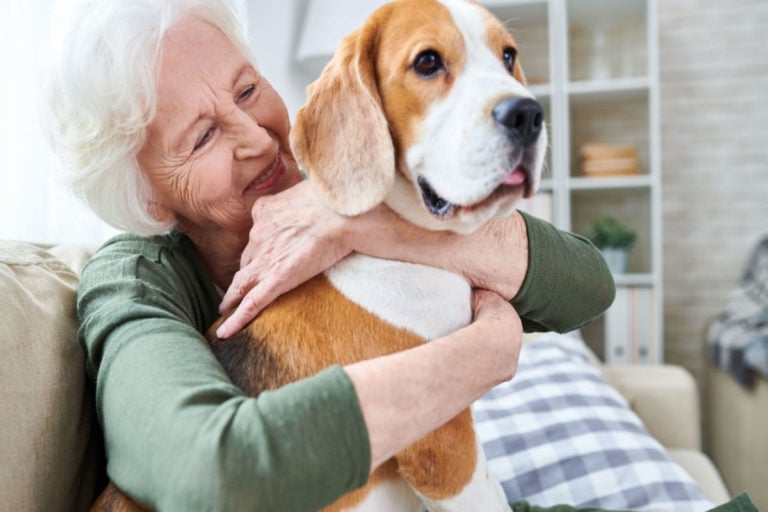WHERE OH WHERE HAS MY LITTLE DOG GONE?
Hopefully, home to his senior!
Pet ownership goes back to the Stone Age when early humans forged relationships with wolves who scavenged food from them. Cats became domesticated in the same way – scavenging for food scraps.
Humans and pets have come a long way since then. Pet ownership is wonderful at any age but the benefits of pets for seniors are numerous.
Here are some of the ways pets can enhance the lives of their senior owners.
Pet Ownership Boosts Physical and Emotional Health in Seniors
Late in the 19th century, Florence Nightingale noticed that animals tended to reduce anxiety in both children and adults. But it wasn’t until the 1960s that formal animal therapy research began.
In the case of seniors, bonding with a pet has overwhelming benefits.
Constant Unconditional Love
Seniors can often experience isolation and loneliness, but a pet will offer “comfort, unconditional love, few or no demands”, and is always present.
Improves Memory
Psychologist Penny B. Donnenfeld has said that she’s “seen those with memory loss interact with an animal and regain access to memories from long ago.”
Gives Purpose
Having pets for seniors adds purpose to an older adult’s life. Knowing that another living thing is dependent upon you requires consistent attention to detail and can get a senior up and on with their day.
Provides Companionship
Most of all, a pet provides companionship giving seniors a source for affection, conversation, and activity.
Pets For Seniors Produces Measurable Health Benefits
Contact with a wagging tail or a purring kitten can lower the stress hormone, cortisol. It can increase serotonin and dopamine the hormones for happiness and well-being. It can also lower blood pressure, cholesterol, and heart rate.
If the dog is walked regularly, it can result in increased exercise (always a good thing) and the chance to socialize with neighbors and other dog owners.
The risk of depression is immediately reduced when a pet is in the home because there is better self-care since having a pet helps in developing a routine for eating, bathing, and chores.
Pet Ownwership Can Benefit Older Animals as Well
When it comes to pets for seniors, its not a one way street. There are benefits for the animals as well as for the adopters.
This is especially true when seniors adopt older pets. “These lucky animals go from the pound to paradise.”
Adopting from shelters is less expensive and “comes with the added benefits of giving an unwanted animal a home and possibly saving it from euthanasia”.
Also, seniors have more time to devote to the care of a previously unwanted pet.
10 Questions to Ask Before Getting Pets For Seniors
Here is a list of questions to help in the selection of the right pet for a senior.
1. Is the senior set in his/her ways?
If so, a pet would not be recommended. Pet ownership typically requires some flexibility on the side of the parent.
2. Have they ever owned pets before?
If so, make sure they are open to a pet at this stage.
3. Does the senior have functional disabilities?
Dogs can be a wonderful way to encourage walking, but they can be challenging if the senior has limited mobility.
4. Instead of a regular pet, would an emotional support animal be the solution?
A specially trained therapy dog can help a senior function both at home and away from home.
5. What would be the best-aged pet to get for the senior?
Young pets need training and will probably outlive the senior. A rescued adult pet would probably be the best solution.
6. What would be the best temperament for the senior?
For example, all dog breeds have general personalities, but dogs within the same breed can have vast personality differences. Try to choose a dog with a matching energy level.
7. Is the pet healthy?
Have the pet examined by a professional before adoption. Older people’s immune systems can be compromised by pets carrying diseases.
8. One pet or multiple pets?
Two pets can keep each other company when the owner is away. But they may bond with each other rather than the owner.
9. Is the senior financially able to own a pet?
Pets are expensive- the costs of food, vet bills, meds, treats, and toys can add up to a significant amount. Be sure to carefully examine the senior’s budget before recommending a pet.
10. Is a backup plan in place?
Is there someone designated to take over care of the pet if the owner has to go to the hospital or relocate to a nursing facility? Is that same person willing to take over ownership of the pet if the senior dies? The last thing anyone wants is for the pet to wind up in a kill shelter.
In Conclusion
Owning a pet while aging in place isn’t for everyone. We recommend consulting with your doctor, vet, family members, and Rachel Kabb Effron to get good feedback on whether this is the right move for you. It could be your best medicine. Don’t tell her I told you to, but ask Rachel about her dog at 216-991-5222.

